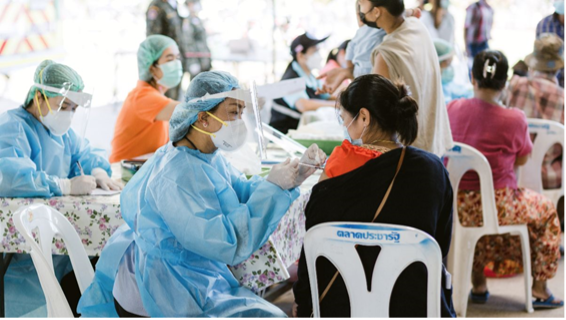International Migrants Day: Honouring Our Migrant Health Care Workers
This report summarises the findings of a UKRI-funded series of studies by Professor Nicola Yeates (Social Policy) at The Open University in collaboration with Public Services International in 2022 has shown that during the pandemic, migrant health workers were regularly and disproportionately exposed to occupational health hazards and were at a greater risk of contracting COVID-19 and experiencing severe harm and death. Policy responses during the pandemic have not addressed these additional risks, nor have they addressed health workforce shortages, thereby putting health care workers and the health of the population in harm’s way.
by Nicola Yeates and Genevieve Gencianos
December 18th 2020

On December 18th, International Migrants Day, we pay tribute to all the migrant health care workers across the world. They are the workers who courageously battled – and continue to battle – the COVID-19 pandemic at the frontlines, staffing our hospitals, delivering critical care, carrying out vaccination drives, and caring for our elderly family members. The majority of them women, many migrant workers leave their own families behind in order to deliver vital care to others abroad. They provide invaluable services to our health systems, yet they are invisible in terms of rights.
Migrant health workers are disproportionately exposed to occupational health hazards and are at a greater risk of contracting COVID-19
A UKRI-funded series of studies by Professor Nicola Yeates (Social Policy) at The Open University in collaboration with Public Services International in 2022 has shown that during the pandemic, migrant health workers were regularly and disproportionately exposed to occupational health hazards and were at a greater risk of contracting COVID-19 and experiencing severe harm and death. Policy responses during the pandemic have not addressed these additional risks, nor have they addressed health workforce shortages, thereby putting health care workers and the health of the population in harm’s way.
Among the risks and unequal impacts of COVID-19 on migrant health workers, our research found:
- Decent work deficits. Migrant health workers often worked excessive hours, had insufficient rest periods, and faced discrimination and wage theft, such as unpaid overtime.
- Migrant health workers are disproportionately affected by discrimination, violence and harassment. Systemic discrimination in health systems pushed migrant health workers to work in high-risk COVID-19 zones. Racialised narratives about the origins of COVID-19 generated unprecedented levels of stigmatisation and discrimination. As 70% of nurses are women, many also face discrimination, sexual harassment, occupational segregation and gender pay gaps.
- Repayment clauses attached to contracts require migrant health workers to pay a substantial sum of money before being allowed to resign. This, along with other vulnerabilities associated with visas and contracts, explains why some workers accepted more hazardous working conditions during the pandemic.
- COVID-19 amplified the existing global shortage of health workers. The most severe shortages are in developing countries, putting the achievement of universal health coverage by 2030 in greater jeopardy.
- Unethical recruitment practices continued during the pandemic, with greater competition for health workers resulting in the active recruitment of critical care nurses and other frontline health care roles in several of the countries with critical shortages that are on WHO’s Health Workforce Support and Safeguard List.
Public Services International and its affiliates stand in solidarity with all the migrant health care workers who are valuable members of trade unions, our workforce and society. A fair, rights-based, socially-just and socially-sustainable governance of health migration is needed for all countries to address the current global health workforce shortage.
Pandemics, disasters and the climate crisis will continue to put a heavy demand on our public services. in the face of these crises, PSI will continue to amplify the voice of workers, including taking to the streets, to demand for adequate investment in public services, and for decent work, safety and social protection for all the workers delivering these services.
Health workers’ rights are human rights!
This short film presents findings from the research project into migrant health care workers during the Covid-19 pandemic. It highlights that migrant health workers have been at greater risk from Covid-19 infection in the workplace, and explains why international recruitment of health workers from overseas adversely impacts on health care services in countries of origin.
